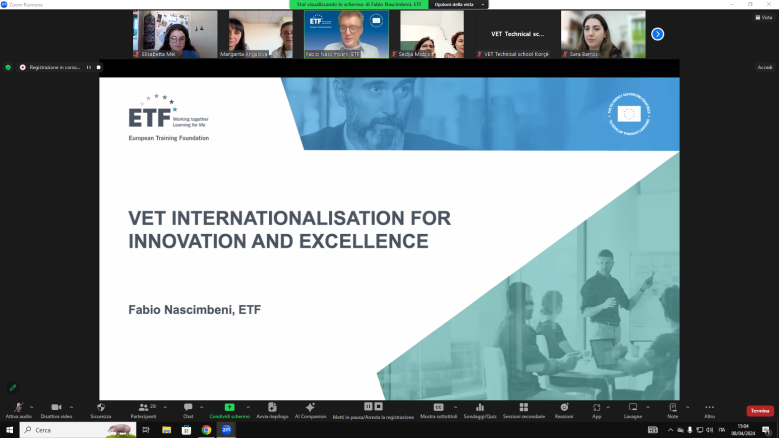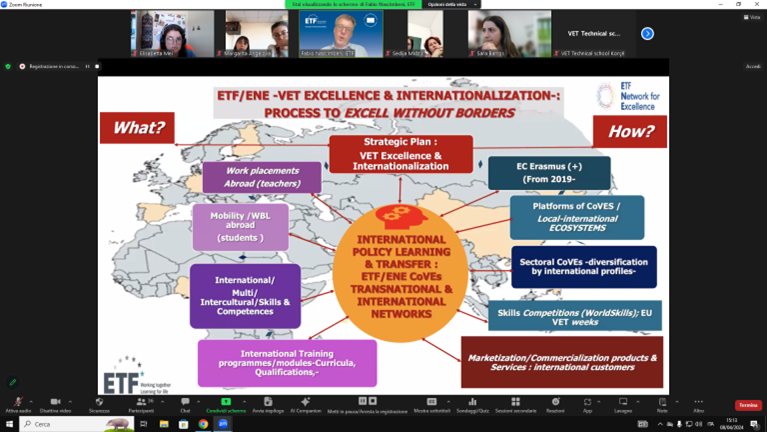Exploring EU mobility challenges


The CO-HOST consortium conducted two key webinars presented as Virtual exchanges, which brought together educators, experts in education and stakeholders to discuss poignant topics regarding European education, mobility and school internationalisation.
The first webinar, „Challenges in EU Mobilities“ was conducted on 29th of March 2024 and featured Mr. Manuel Ribeiro Bacelar from the Ministry of Education in Belgium who led an insightful discussion on the diverse challenges and opportunities, which may be encountered in European mobilities. The online event hosted 57 external attendees including educators from across Europe and was conducted in three parts.
Firstly, the moderator of the online event Ms. Sara Barros gave an overview of the CO-HOST project (“Creating Opportunities for VET Mobility in HOSpitality and Tourism”), highlighting the project aims and objectives, scope, partnership, as well as the valuable project outputs, especially the MOOC course. The primary aim of the 4-month-long MOOC is to equip participants with essential skills such as writing project applications, implementing Quality Assurance plans, and effectively managing EU funded projects as partners, offering unique opportunities for learners to explore the diverse possibilities within the Erasmus+ programme.
The second part included a valuable overview of the Erasmus+ Mobility programme with specific focus on the Erasmus+ cycle of the mobility project management and the four key phases:
- I: Notification of Results and Contractualisation
This phase includes notifying beneficiaries and formalising contracts and ensuring all activities, objectives, and budgetary frameworks are clearly defined.
- II: Implementation of Activities
The stage of preparation and coordination with specific focus on human resources and logistics including selecting beneficiaries, preparing them adequately, handling official documentation, defining the roles of all involved organisations and ensuring effective collaboration.
- III: Placement Follow-Up
This involves supporting accompanying persons and maintaining detailed logbooks for both accompanying individuals and trainees. Regular placement assessments and effective communication among all actors are key components. Cultural activities are encouraged to enhance the experience, and activities are regularly reported.
- IV: Reports, Controls, Valuation, and Dissemination
The final phase involves comprehensive reporting, monitoring, and evaluation. This includes creating BM reports on beneficiary activities, conserving supporting financial documents, conducting impact evaluations, and disseminating the results and findings.
The last part of the first virtual exchange concluded with a Q&A session with Mr. Manuel Ribeiro, who illuminated participants’ queries regarding various aspects of EU mobility implementation.
School Internationalisation Strategies
The second virtual exchange was held on April 8th, 2024, on the topic of „School Internationalisation Strategies“, attracting 37 participants. The online event was moderated by Ms. Margarita Angelova from ECQ and included insightful presentations by Mr. Fabio Nascimbeni from the European Training Foundation and the EFT Community of Innovative educators as well as Mr. Russi Russev Phd, a high-school teacher from the National High School in Finance and Business, Bulgaria.
The webinar also utilised the CO-HOST padlet in which participants were encouraged to share ideas and experiences regarding School internationalisation.

In the first part of the virtual exchange, Mr. Nascimbeni presented the European Training Foundation and EFT Community and how schools can benefit from joining the network. Furthermore, he shared the current innovative learning clubs, inviting participants to join in the upcoming online webinars, which could prove to be fertile ground for upskilling of VET teaching staff. Mr. Nascimbeni elaborated to the participants the importance of school internationalisation and all the subsequent benefits from the process.

Second part of the webinar saw Mr. Russi Russev who shared the teachers’ perspectives with regards to mobilities as well as some of his students’ highly positive experiences during the student exchanges. He presented the school’s curriculum and school life as well as the achievements of the school with regards to various mobilities. Important information was shared on how to determine the internationalisation and mobility needs of a school, the added value mobilities present to both teachers and students as well as strategies on how to find partners abroad and establish contact for the successful implementation of school internationalisation. Mr. Russev also shared the positive impact mobilities had on the teachers’ improvement of teaching methodologies and materials as a result of mobility participation.
The last part of the webinar included illuminating Q&A session where Mr. Russev shared practical strategies incorporated thanks to taking part in mobilities, while Mr. Nascimbeni elaborated upon the most common challenges schools face with regards to internationalisation.
Furthemore, the CO-HOST project padlet was reviewed by Ms. Angelova, who shared all of the participants’ ideas and suggestions with regards to student exchange programmes, school internationalisation and establishing partnerships.
The CO-HOST consortium extends their heartfelt thanks to all participants for their active involvement and contributions, making both webinars a resounding success.

Funded by the European Union. Views and opinions expressed are however those of the author(s) only and do not necessarily reflect those of the European Union or the European Education and Culture Executive Agency (EACEA). Neither the European Union nor EACEA can be held responsible for them.

